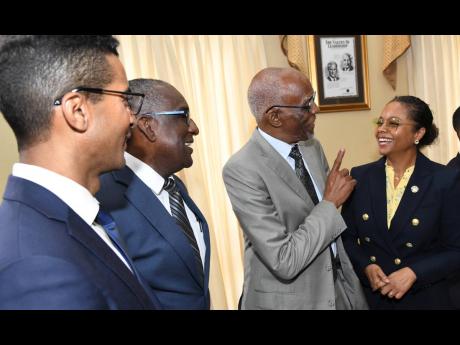Attorney quota justified, says Canadian expert
Albert satisfied with lawyer complement on constitutional reform body
RICHARD ALBERT, the Canadian expert hired by the Government to advise the Constitutional Reform Committee assembled to guide the country’s transition from a constitutional monarchy to a republic, says this requires a very technical, legal and...
RICHARD ALBERT, the Canadian expert hired by the Government to advise the Constitutional Reform Committee assembled to guide the country’s transition from a constitutional monarchy to a republic, says this requires a very technical, legal and involved process.
His assessment runs counter to concerns raised by public commentators and at least one civil society group that the committee lacks diversity and is too weighted with members of the legal profession.
Eleven of the 14 committee members are attorneys-at-law.
Albert, who is a law professor at the University of Texas at Austin in the United States, is a trained scholar of world constitutions, constitutional reform and constitutional replacement.
“The Constitution of Jamaica right now is not a home-grown constitution. Jamaica officially has a status of constitutional monarchy, which means that the head of state is the monarch, the king of England,” Albert said in a Gleaner interview.
“And so, it requires a very technical, legal and involved process to transform Jamaica from a constitutional monarchy to a constitutional republic. And so, the expertise on the committee will allow the country to do that and do it right,” he added.
Phase I of the reform process is to focus on the repatriation of the Constitution, abolition of the constitutional monarchy, establishment of republican status, and all matter within the deeply entrenched provisions of the Constitution for which a referendum is required to amend.
Phase ll is to look at the wording and provisions of the Charter of Fundamental Rights and Freedoms set out in Chapter III, and the ordinarily entrenched provisions of the Constitution for which amendments are desired and required.
Phase lll is to focus on fully assessing the country’s legal and constitutional infrastructure to facilitate putting together a new constitution.
“The first phase will complete the task of proposing a bill that will achieve this important transformation of making Jamaica at last a republic and cutting the vestigial ties of colonialism to the imperial parliament,” said Albert, whose last consultation was in Chile as that country undergoes constitutional reform.
He has also worked with other regional governments and several in Europe. However, none has been as public as the work he is set to do with Jamaica, he admitted.
“The world is watching; the region is watching. Jamaica is respected in the region and abroad. It’s a leader; it’s a democracy and there aren’t that many occasions in recent memory when democracies have written a new constitution,” he said.
Albert said only Switzerland, in 1999, and Finland, in 2000, as prominent democracies have, in recent history, adopted new constitutions.
He argued that it is imperative that Jamaica makes this break from the imperial parliament to decolonise amid a long history of efforts that have so far stalled.
“This is a moment where I think that the minister and the entire committee can do good and make right on those commitments that were made before,” he said.
Marlene Malahoo Forte, minister of legal and constitutional affairs, will chair the meeting while Lieutenant General Rocky Meade will serve as co-chair.
Leader of the Opposition Mark Golding told journalists on Sunday that it was only after he and his team met with Prime Minister Andrew Holness during the Vale Royal talks late February that they were made aware of committee members.
“When they set this thing up, they never consulted with us on how it should be set up. They wouldn’t even tell us who was on the committee ... . They haven’t really approached this in a consultative way, and I think the committee is going to be less effective because of that. But we’re supporting the work of constitutional reform,” said Golding.
The Opposition subsequently named two of its members, Senator Donna Scott-Mottley and Member of Parliament Anthony Hylton, to the committee. The two are lawyers.
A third attorney, King’s Counsel Hugh Small was also appointed based on Golding’s recommendation, and accepted by Holness.
“I do understand the point that’s being made by the public that we ought to have a broader cross-section from the society reflected on the committee. I think it has to have a strong legal base because a lot of the issues are legal issues and technical issues, but it can’t be limited to that.
“It needs to have other stakeholders, union leaders, churches and other groups that have a significant role in the society represented as well,” Golding asserted.

